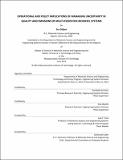| dc.contributor.advisor | Randolph Kirchain and Elsa Olivetti. | en_US |
| dc.contributor.author | Gülșen, Ece | en_US |
| dc.contributor.other | Massachusetts Institute of Technology. Technology and Policy Program. | en_US |
| dc.date.accessioned | 2013-01-07T21:23:26Z | |
| dc.date.available | 2013-01-07T21:23:26Z | |
| dc.date.copyright | 2012 | en_US |
| dc.date.issued | 2012 | en_US |
| dc.identifier.uri | http://hdl.handle.net/1721.1/76131 | |
| dc.description | Thesis (S.M.)--Massachusetts Institute of Technology, Dept. of Materials Science and Engineering; and, (S.M. in Technology and Policy)--Massachusetts Institute of Technology, Engineering Systems Division, Technology and Policy Program, 2012. | en_US |
| dc.description | Cataloged from PDF version of thesis. | en_US |
| dc.description | Includes bibliographical references (p. 169-177). | en_US |
| dc.description.abstract | As an alternative transportation fuel to petrodiesel, biodiesel has been widely promoted within national energy portfolio targets across the world. Early estimations of low lifecycle greenhouse gas (GHG) emissions of biodiesel were one of the main drivers behind extensive government support in the form of financial incentives for the industry. However, several recent studies have reported a high degree of uncertainty and variation (U&V) in these emissions, raising questions concerning the carbon benefits of biodiesel compared to petrodiesel. A smaller degree of U&V in physical feedstock characteristics emerging from compositional variation was already known to producers. Although feedstock blending has been broadly practiced by the industry to meet multiple fuel quality standards and to control costs, its implications on these U&V characteristics of biodiesel have not been explicitly addressed by researchers or policymakers. This work investigates the impact of feedstock blending on the U&V characteristics of biodiesel by using a chance-constrained (CC) blend optimization method. The objective of the optimization is minimization of feedstock costs subject to fuel standards and the decision variables are feedstock proportions. Two sets of prediction models are developed to represent the physical properties and lifecycle emissions of feedstocks within the CC model. The results indicate that blending can be used to manage U&V characteristics of biodiesel, and to achieve cost reductions through feedstock diversification. Monte Carlo simulations suggest that emission control policies which restrict the use of certain feedstocks based on their GHG estimates, overlook blending practices and benefits, lowering the quality and increasing the cost of biodiesel. In contrast, emission control policies which recognize the multi-feedstock nature of biodiesel, provides producers with feedstock selection flexibility, and enables them to manage their blend portfolios cost effectively without compromising fuel quality or emissions reductions. | en_US |
| dc.description.statementofresponsibility | by Ece Gülșen. | en_US |
| dc.format.extent | 182 p. | en_US |
| dc.language.iso | eng | en_US |
| dc.publisher | Massachusetts Institute of Technology | en_US |
| dc.rights | M.I.T. theses are protected by
copyright. They may be viewed from this source for any purpose, but
reproduction or distribution in any format is prohibited without written
permission. See provided URL for inquiries about permission. | en_US |
| dc.rights.uri | http://dspace.mit.edu/handle/1721.1/7582 | en_US |
| dc.subject | Materials Science and Engineering. | en_US |
| dc.subject | Engineering Systems Division. | en_US |
| dc.subject | Technology and Policy Program. | en_US |
| dc.title | Operational and policy implications of managing uncertainty in quality and emissions of multi-feedstock biodiesel systems | en_US |
| dc.type | Thesis | en_US |
| dc.description.degree | S.M.in Technology and Policy | en_US |
| dc.description.degree | S.M. | en_US |
| dc.contributor.department | Massachusetts Institute of Technology. Department of Materials Science and Engineering | |
| dc.contributor.department | Massachusetts Institute of Technology. Engineering Systems Division | |
| dc.contributor.department | Technology and Policy Program | |
| dc.identifier.oclc | 821680544 | en_US |
